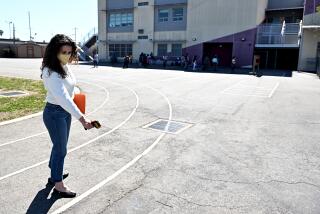Hueneme, Fillmore Plan to Put School Bonds on June Ballot
Despite the added cost, the Hueneme and Fillmore school districts are placing multimillion dollar bond issues on the ballot in June rather than November, in the hope that more informed voters will vote to pass them.
The school bond will be the only item on the ballot in both cities, which likely means fewer but more educated voters will turn out, said local election experts.
The $7.5-million Fillmore school bond would finance construction of a new elementary school. A similar measure was defeated in March when it narrowly failed to receive the necessary two-thirds majority.
The June election will cost the Fillmore Unified School District $14,000. It would cost about $2,000 if the district waited until the fall presidential election.
John Garnica, a trustee on the Fillmore Unified School District board, defended the timing, saying land needs to be secured from the owner.
“The developer is concerned that if we take too long with the bond, we might never build the school and they would be stuck with a vacant lot,” he said. “They want to have the option to build more homes there if we can’t come through.”
Hueneme’s $6.95-million school bond would modernize schools, all of which are 30 to 75 years old.
It will cost the district $31,000 to hold the election in June, instead of $5,000 for a fall election.
“To pay several thousand dollars more is not a preference of ours, but compared to delaying and potentially losing state money we knew what our priorities were,” Hueneme Supt. Robert Fraisse said. The district is eligible to receive an 80% matching grant from the federal government.
He said the district did not put the bond on the ballot earlier this month because it was hoping Proposition 26 would pass. That proposition on the March ballot would have reduced from two-thirds to a simple majority the margin necessary to pass local school bonds. The initiative failed.
County elections chief Bruce Bradley said consultants increasingly advise districts that the easiest way to pass a school bond is to have fewer voters, so that likely voters can be more easily targeted.
Moorpark Unified School District put its $16-million school bond on the ballot twice, once in a November general election and once in the April 1998 special election. Neither passed.
But the Oxnard Elementary School District’s $57-million bond passed in a June 1997 special election.
Garnica agreed that timing is part of that city’s strategy. “A lot of times you have people who are uninformed and they show up just to vote for the president. This way the people who show up will be the ones who know what it is about.”
The drawback is the high cost, which Bradley said can irk voters.
“When the voter is aware, they get upset when they see special elections, because they know it’s more costly, and they wonder why,” he said.
More to Read
Sign up for Essential California
The most important California stories and recommendations in your inbox every morning.
You may occasionally receive promotional content from the Los Angeles Times.










